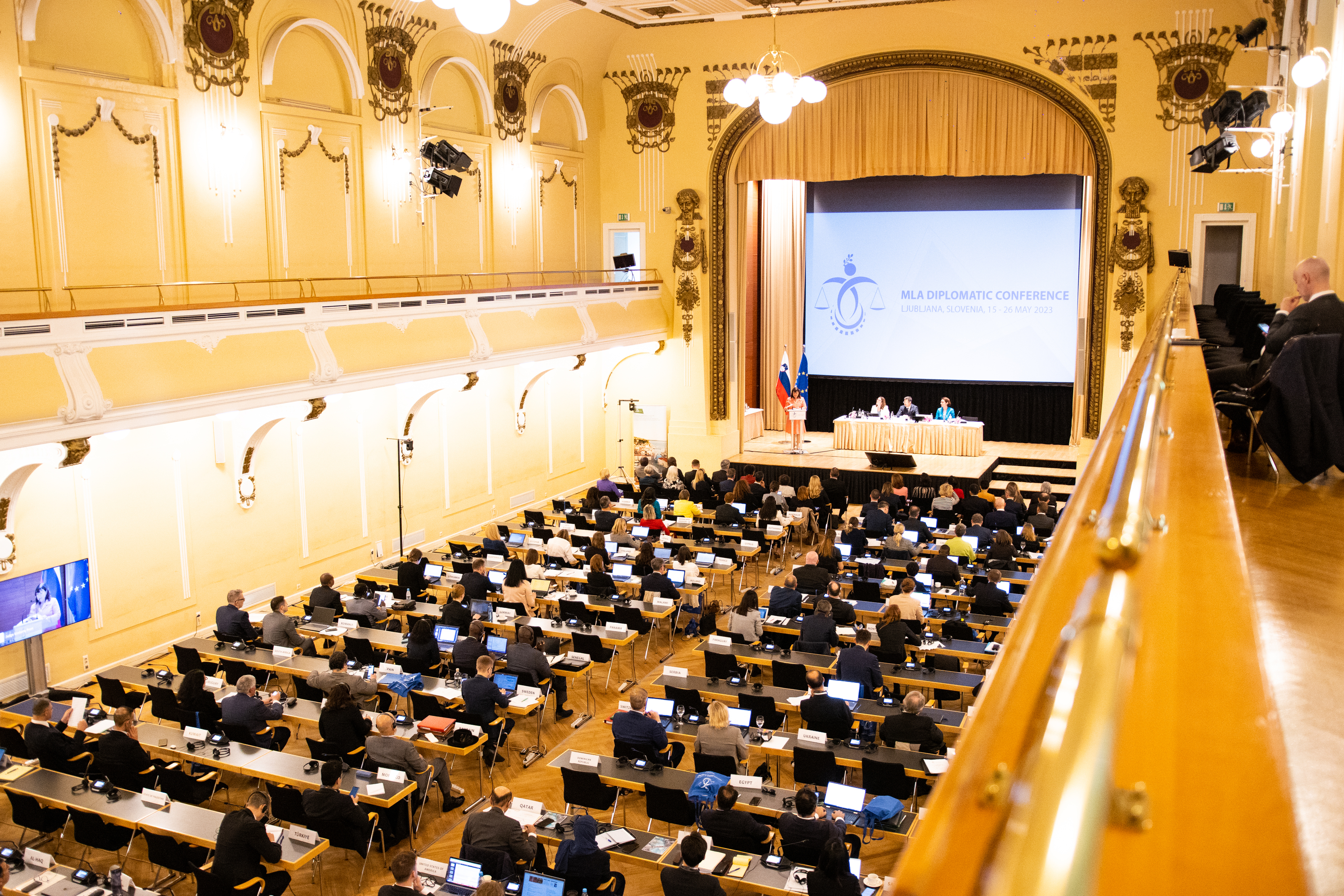An Assessment of the Ljubljana-The Hague Convention on Mutual Legal Assistance
The most significant treaty in international criminal law opens for signatures in January 2024.

This summer saw the adoption of the first major treaty fighting impunity for international crimes since the Rome Statute 25 years ago. It builds on many of its predecessor’s approaches—while introducing a few new definitions of its own.
The draft Ljubljana-The Hague Convention on Mutual Legal Assistance, which was adopted in May, aims to strengthen investigation and prosecution of international criminal law. It sets forth a framework within which parties can cooperate in pursuit of this goal on matters ranging from collection and sharing of evidence, to conducting joint investigations, to extradition of suspects, to taking measures in support of victims’ and witnesses’ rights. The treaty’s official, admittedly lengthy, title—the Ljubljana-The Hague Convention on International Cooperation in the Investigationa and Prosecution of Genocide, Crimes Against Humanity, War Crimes, and Other International Crimes—underscores another key feature of the treaty: defining certain substantive criminal laws.
Delegations from 70 countries negotiated the draft convention and adopted it by consensus in May. More than a decade after the first proposal for a mutual legal assistance initiative, Argentina, Belgium, Mongolia, the Netherlands, Senegal, and Slovenia led the negotiations in the Slovene capital of Ljubljana. The convention is expected to open for signature in the first quarter of 2024.
Below, we explore the developments in the convention and its role in the larger universe of international criminal law.
What Is Mutual Legal Assistance?
The convention serves as a platform to facilitate mutual legal assistance (MLA) between states through a formalized set of expectations and requirements. MLA agreements allow domestic criminal and judicial systems to share information, collaborate in investigations, and coordinate efficient means of fighting impunity for the “most serious crimes of concern to the international community as a whole.”
This collaboration is especially important in a globalized world. An alleged offender may be a national of one country who committed serious international crimes in a second country and sought refuge in a third. Thus it is crucial for states to formalize the means by which their domestic criminal systems coordinate.
The United States, for example, has existing bilateral MLAs with over 80 countries. The convention draws from existing bilateral MLAs, as well as public international law, in an attempt to create a streamlined mechanism by which states can rely on a multilateral approach to investigating and prosecuting international criminal laws. However, the convention includes a provision that protects prior MLAs that exist between signatories.
MLA agreements emphasize that states have the primary responsibility to investigate international crimes. This mirrors the Rome Statute of the International Criminal Court, which gives deference to the principle of complementarity, or the recognition that domestic regimes should be the primary means of investigating and prosecuting crimes.
The convention spells out procedures by which states should coordinate. Specifically, it requires states to designate central authorities responsible for communicating with other states, select the means by which it will send and receive requests, and establish relevant points of contact.
It then details the mechanics of mutual legal assistance between states. First, it lists the kinds of assistance states may request, which include taking and preserving evidence, executing searches, facilitating the transfer of detained persons, and several others, as well as a catch-all provision for “any other type of assistance that is not contrary to the domestic law of the requested State Party.” Next, it describes the requirements for making requests—including that they must be in writing, that they must provide specific information concerning the subject matter and nature of the investigation, as well as eight other categories of information, and that requests must be kept confidential. The convention also includes a lengthy provision outlining the grounds on which a state may refuse another state’s MLA request.
Notably, many provisions of the convention focus on how MLA requests and responses will be implemented in practice. For example, it gives procedures for collection of evidence for crimes that occurred outside the investigating state’s territory. The assisting state can examine sites, provide evidentiary items, collect depositions of witnesses, gather domestic expert evaluations, coordinate with victims, or otherwise aid the investigating state in conducting a fair evaluation of the alleged crimes. Likewise, the convention provides rules about deposing witnesses, conducting hearings by video conference, transferring detained individuals, among other issues. It also describes in detail the manner in which two or more states may establish joint investigation teams.
MLAs also address data privacy coordination in order to accommodate differing standards in domestic legislation surrounding data protection and privacy. MLAs provide states with a legal standard for the sharing of confidential materials and responding to cybercrime.
The Scope of the Convention
The main text of the convention links mutual legal assistance to specific international criminal laws of genocide, crimes against humanity, war crimes, and certain other international crimes. In other words, the terms of the convention apply when a state party requests assistance from another state party in connection with an investigation or prosecution under those enumerated crimes. Its definitions of those crimes are nearly identical to those in the Rome Statute.
The convention also includes several annexes with additional definitions for war crimes, torture, enforced disappearance, and the crime of aggression. States have the option to elect to extend the scope of the convention to cover those crimes as well, but they are not required to do so. The convention will apply to requests relating to those definitions only when both the requesting and requested states have chosen to accept the annexes in this manner, though states that have not accepted the annexes can decide on an ad hoc basis to apply the convention to those crimes.
Most of the annexes devote space to defining additional acts that qualify as war crimes. Some of those acts are present in the Rome Statute, such as use of poisonous or asphyxiating materials or “bullets which expand or flatten easily in the human body,” or intentional starvation of civilians. Others are new, including use of weapons that employ “microbial or other biological agents, or toxins,” weapons that can injure the human body by creating fragments undetectable by X-rays, and weapons designed solely or primarily to cause permanent blindness.
The annexed definition of “torture” goes beyond the Rome Statute’s definition. It extends the understanding of “torturous acts” to intentional infliction of physical or mental suffering “for such purposes as obtaining from him or a third person information or a confession, punishing him for an act he or a third person has committed or is suspected of having committed, or intimidating or coercing him or a third person, or for any reason based on discrimination of any kind.” The convention’s definition applies when a public official causes, authorizes, or consents to the torturous acts.
The main text of the convention does not include the crime of aggression or enforced disappearance as grounds for mutual legal assistance. However, the annexes to the convention include definitions for aggression and enforced disappearance consistent with the Rome Statute.
The Duty to Prosecute or Extradite
Under customary international law, states have an obligation to prosecute or extradite (aut dedere aut judicare) individuals within their jurisdiction accused of the most serious international crimes. However, custom does not specify the procedure for doing so. This convention fills that gap.
Each state party is obligated to take measures to establish jurisdiction over the relevant crimes when the crimes are committed within its territory or when the alleged offender is a national of that state. States are permitted, but not required, to establish jurisdiction over crimes when the alleged offender is a stateless person who habitually resides within that state’s territory or when the victim is a national of the state.
If a state party decides to investigate and prosecute the alleged offender, other states parties must afford one another “the widest measure of mutual legal assistance.” The convention also ensures alleged offenders are guaranteed fair treatment at all stages of the proceedings.
If a state does not establish jurisdiction to prosecute an alleged offender present within its territory, it must extradite the alleged offender or surrender the alleged offender to a competent international criminal court or tribunal.
The convention dedicates a significant amount of space to extradition—that is, what happens when a state seeks to prosecute, under one of the applicable crimes, an individual located outside of its own territory. Most frequently in these situations, a requesting state will ask the government of the host state (that is, the state in which the individual is located) to extradite the accused individual for domestic prosecution where the crimes occurred or where the individual is a national. This may be the most efficient measure, if the majority of witnesses, victims, evidence, and relevant experts are located where the crime occurred.
The convention streamlines the procedure for requesting extradition from states parties. The request must be made in writing with a description of the person, the law relevant to the crime, the arrest warrant, and any other relevant information related to the procedural posture. All requests must be kept confidential, except to the extent necessary to comply with the request.
If extradition is requested concurrently by more than one state or tribunal, the requested state must consider the primacy of the jurisdiction or the relative gravity, nationality, and place of the crimes. Once extradition is agreed upon, the relevant parties can coordinate among themselves to determine a place and date of transfer.
The convention also provides protections for the accused. Requested states may refuse to provide assistance if the requesting state is seeking to punish someone on account of their race, gender, mental or physical disability, sexual orientation, religion, nationality, political opinion, or membership in a particular social group. States may also refuse cooperation when the investigation concerns a crime that is punishable by the death penalty under the domestic law of the requesting state or life imprisonment without parole. In order to protect fundamental human rights, requested states can deny assistance if the individual has already received final judgment for the same crime, would be subject to torture or other cruel, inhuman, or degrading treatment, or otherwise be denied a fair trial.
A New Era for Victims’ Rights
While only a few articles of the convention are dedicated to victims’ rights, they take an expansive approach. The convention applies the term “victim” not only to natural persons who are harmed but also to “organisations or institutions that have sustained direct harm to any of their property which is dedicated to religion, education, art, science or charitable purposes, or to their historic monuments, hospitals and other places and objects for humanitarian purposes.”
The convention explicitly gives victims the right to reparations, including but not limited to “restitution, compensation or rehabilitation.” Victims are due reparations from a state party in two scenarios: when the crimes occur in the state party’s territory, and when the state party otherwise exercises jurisdiction over the case.
The convention also requires criminal proceedings to make space for victims to participate if and when they desire. It acknowledges the long-standing rights of victims, witnesses, relatives, representatives, experts, and other associates to due process and freedom from retaliation or intimidation. But it goes even further by requiring states parties to implement procedures for physical protection of those individuals.
The convention also appears to address the ever-present risks of victim retraumatization, obligating states parties to create environments that “allow victims, witnesses and experts to make a deposition in a manner that ensures their safety and, as appropriate, their physical and psychological well-being and privacy such as allowing the use of communication technologies.”
Transferring Sentenced Individuals
The convention sets out detailed requirements related to the transfer of sentenced individuals from the state party that handles the sentencing to a state party that administers the remainder of the sentence.
The convention allows the sentencing party, the administering party, or the sentenced individual to request transfer. If the sentenced individual requests a transfer, the sentencing party must inform the administering party as soon as practicable.
In most cases, the sentenced individual must consent to the transfer. However, the convention creates two main exceptions to this rule. It allows for transfer without the individual’s consent when the individual has fled to their state of nationality, a third-party state. Transfer can also occur without the individual’s consent when the sentence itself includes a final expulsion or deportation order.
Under the convention, the existing nature and length of the sentence, as well as the factual findings on which the sentence is based, typically bind the administering parties. The administrating party can begin enforcement of the remaining sentence immediately after the sentenced individual is transferred to its jurisdiction.
The Next Steps
The convention will open for signatures in January 2024.
At least three states must ratify, accept, approve, or accede to the convention before it can enter into force. The convention will not take immediate effect after it gains a third state party; rather, at least three months will elapse between the time the third state party joins and the time the convention enters into force.
Amendments and additional annexes can be added to the convention five years after it enters into force or five years after the 15th state ratifies, accepts, approves, or accedes to the convention, whichever comes later.
The process permits states parties to take a few select reservations to the convention. Article 8(3), which governs jurisdiction when an alleged offender is present in a state party’s territory, allows reservations, as do Article 39, which governs “special investigative techniques,” such as “electronic or other forms of surveillance and undercover operations”; Article 40, which governs covert operations; and Article 42, which governs cross-border law enforcement observations.
Two additional articles expressly allow for reservations: Article 86(3), which allows states parties to reserve from the arbitration and the International Court of Justice (ICJ) referral process; and Article 90(5), which allows states parties to reserve the right not to apply the convention to acts/omissions that occurred before a certain date, so long as that date precedes the date of entry into force for that state party.
Finally, the convention provides means for settling disputes among states parties. It requires the states parties to attempt negotiations and pursue arbitration if negotiations fail. If the states parties cannot agree on an arbitration organization within six months, they can bring the dispute to the ICJ.

.jpeg?sfvrsn=71712015_3)


.jpg?sfvrsn=d27bd863_5)

